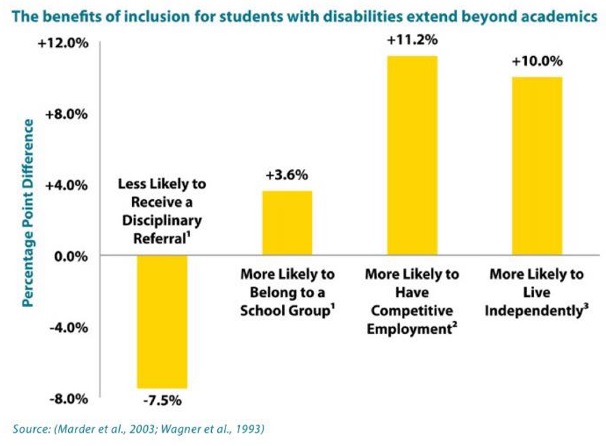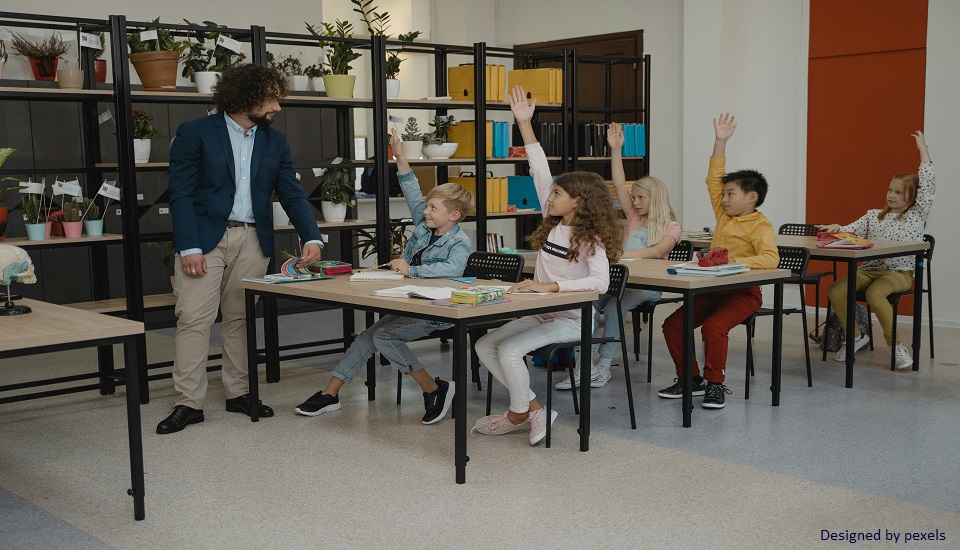Every child has the fundamental right to education.
However, in the earlier days, the situation was quite dire, because earlier students faced discrimination based on their abilities, race, gender, background, etc. But as time progresses, schools have become more welcoming for students from every sector and provide equal education opportunities.
Nowadays, most schools encourage and celebrate every child’s different abilities and uniqueness by creating an inclusive classroom environment.
If you are a teacher who also wants to create an inclusive learning environment for special needs students and every student from a different background, then we have got you covered.
In this blog post, we will be exploring about inclusive education, its benefits, and how a teacher can play their role in inclusive education successfully.
Before you move to the topic, can we ask you a quick question? Do you follow us on Social Media? If not, then you’re missing out on a lot of informative content. We regularly share upgraded educational content, tips, feedback, and more. Check us out by clicking the profiles here - Facebook / Twitter / LinkedIn / Pinterest / Instagram / YouTube
So, without any further delay, let’s get started.
What is Inclusive Education?
Inclusive education means every student gets included in the general classroom settings regardless of their physical and mental abilities and gets equal opportunity. In an inclusive classroom, every teacher strives to provide equal opportunity in education to students from diverse cultures, races, backgrounds, and abilities.
Benefits of Inclusive Education
Let’s get to know the various benefits of adopting inclusive education for primary school pupils:
Improved Academic Performance

Source: allmeansall.org.au
One of the primary benefits of adopting inclusive education is it significantly improves the academic performance of special needs students by providing them with necessary support and creating a positive learning environment.
Improved Social Skills
When Teachers in inclusive classrooms encourage special needs students to interact with general students it not only improves their social skills but also teaches every student to understand different cultures and accept each other unique abilities.
Improve Physical development
In inclusive education, teachers conduct various fun extra-curricular activities that encourage every student, even special needs students to engage in it. This will promote every student's physical development.
Build Close-Knit Community
Adaption of inclusive education not only helps special needs students feel included but for their families too. Every special needs student and their families feel included which leads to a close-knit community.
Roles That Teachers Play In Inclusive Education
1. Identify Special Needs Students
One of the important roles that teachers play in Inclusive education is identifying students with special needs traits. Teachers also try to figure out special needs students-
- Strength
- Weaknesses
- Social Difficulties
- Behavioural issues
- Physical challenges
- Learning difficulties
To understand special needs students and their learning needs better, teachers also consult with their parents, caregiver that could help them to create a personalized learning experience and to provide proper accommodations.
2. Create a Collaborative Learning Environment
The teacher’s role in inclusive education is also to create a collaborative learning environment for special needs students. Teachers conduct various tasks and activities for special needs students, which allow them to work with children with different skills. This will help special needs students to work together, develop social skills, and enhance their confidence level to give their best in their respective tasks or activities.
3. Adapt Assignments and Grading System
Teachers in inclusive education need to be aware that they need to create assignments and change the grading system according to special needs students. The general way of creating assignments and grading systems can create unnecessary pressure on special needs students and it affects their academic performance.
Teachers should consider using additional grading systems, and provide guidance and feedback, which helps them to complete their assignments and perform better on their tests.
4. Give Assurance To Parents
Parents of special needs students always feel anxious and skeptical about their children's classroom experience and their day-to-day activities. As a responsible teacher, you must make every parent comfortable by keeping them updated about their children’s progress in the classroom.
5. Adjust Curriculum and Instructions Formats
Teachers in inclusive education always develop curriculum in such a way that promotes the academic, social, physical, and emotional development of special education students. You can also consider adding multimedia resources like- images, and videos to make the learning process more engaging and interactive for students of different abilities.
On the other hand, Teachers also modify their knowledge delivery method which helps students with special needs understand the taught lesson easily. Different instruction methods you can consider like-
- Interactive Whiteboards
- Peer Learning
- Students-led presentations
- Learning via video and audio mode, etc.
6. Collaborate With Other Teachers
The learning needs of special needs students can be diverse and one teacher does not have all the necessary knowledge and teaching experience to cater to them. However, if teachers collaborate with other teachers, this will allow every teacher to share their ideas, expertise, and experiences which every teacher to cater different learning needs of specially abled students.
7. Providing Additional Learning Resources
The attention span of both general and special needs students is getting shorter, whether they are learning in inclusive classrooms or in general classrooms. On top of that, every student’s learning pace is different from each other.
To support them in their learning journey, you can consider introducing supportive resources like-
- Pre-recorded lessons
- Worksheets
- Flashcards
- Visual aids, etc.
This will help students to understand their learning resources and get more engaged in their learning journey.
8. Provide Necessary Support & Guidance
In an inclusive classroom, some of the special needs students might need extra support and assistance than others. Every student requires different kinds of support and assistance.
For example- Some students might need extra attention from their teachers to understand the concept properly.
To cater to every special need and general student, you can suggest them to work with their peers who have already completed their tasks and assignments. This will help them to work and socialize with each other.
However, if they still feel the need for guidance, then you must provide them one-on-one support and guidance.
Inclusive Education Is The Key To Special Need Student’s Success
Every child has the right to have access to quality education without facing any discrimination based on their abilities, race, gender, or background. Inclusive education is the solution to provide quality educational experiences, resources, and tools to every students.
Consider going through all the above-mentioned roles that a teacher needs to fulfill to create a positive and inclusive learning environment for every student. If you want to learn more effective strategies and methods to cater to special needs students, then consider pursuing courses like Special Education Courses in Mumbai, where you will get assistance from top expert trainers from the education industry.
We believe education should be accessible for everyone. That’s why we don’t charge for our blogs. Find the right course that will help you in your career with us, contact us at - 1800–212–6400. You can mail us at act@asiancollegeofteachers.com.
Written By : Abhishek








